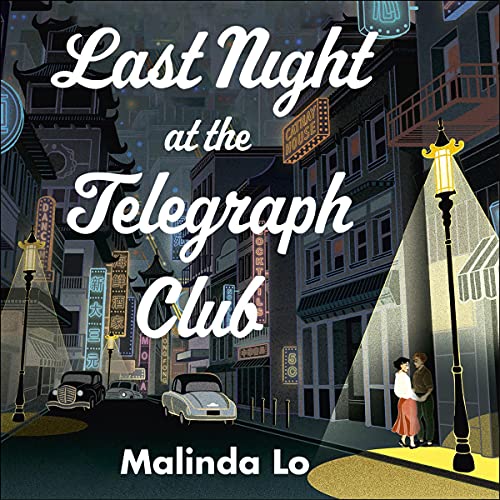When a friend recommended Last Night at the Telegraph Club, I had high expectations. Last Night at the Telegraph Club, written by Malinda Lo, is a young adult historical novel that takes place in the 1950s in San Francisco. Initially, I was excited to read a sapphic novel with a POC main character set in a local city, and although the story was beautiful, I was left disappointed.
The novel follows the life of Lily Hu, a Chinese-American girl, as she develops a romantic relationship with another girl at her school. Lily is a straight-A student with dreams of traveling to space. However, Lily feels as if her dreams are just dreams due to the responsibilities of being the eldest child. As she gets closer to graduating, her friendship with her childhood best friend, Shirley, starts to deteriorate. Their friendship falls apart even faster when Lily befriends Kat, a girl who many assume to be a lesbian. Shirley doesn’t like Kat because she’s concerned about the repercussions of being associated with an assumed lesbian.
When Kat invites Lily to the Telegraph Club, a hidden gay bar in SF, Lily is overwhelmed. Lo does an amazing job of describing the ease and freedom clubgoers feel as they are finally allowed to be themselves. Even though it’s a very loved space, we can understand why Lily feels so overwhelmed. She wants to love the club, but she hasn’t accepted herself yet so the club is hard to adjust to. Although the Telegraph Club is a safe space, there are times when racist remarks targeted at Lily make her feel like an outsider. The racism is just Lo using time-period appropriate language, but the lack of confrontation makes it uncomfortable. I wished Lo had done something in those scenes, like having a character telling another to not call Lily “China Doll.” Additionally, the way Lo set up scenes with Lily being called “China Doll” and Lily calling African-Americans “Negroes” made me believe the plot was going to be focused on race, but it wasn’t. The lack of action when it came to these racial comments and Lily’s dismissal of them seems like something that could’ve been confronted more directly. Lo also leaves some details unexplained in the book. For instance, one of the characters is worried that their father may be deported because of an FBI investigation. However, it was never mentioned again. This is also done with Kat’s character. I cannot tell you ten things I know about Kat because there is not much written about her. It doesn’t take away from the overall experience of the book, but it does seem weird in retrospect. It’s as if Lo didn’t fully develop one of the main characters.
When Shirley confronts Lily about her secret life at the Telegraph Club, Lily becomes emotionally distraught. Even though I saw it coming, that was the most hurtful scene in the book. When Lily ends their friendship, rumor spreads about Lily and the Telegraph Club. Lily’s mother tries to get Lily to deny the rumors for the sake of the family reputation and to also save Lily from “that” life. Refusing to lie about herself, Lily runs away to find Kat. Although my favorite chapter follows that scene, at that point, it felt as if Lo couldn’t wait for the book to end. The ending was dull and fast-forwarded into the future, where there is no mention of the past. Overall, the ending was out of tune with the previous writing and completely unsatisfactory.
After having read the novel, I would give it an 8.5 out of 10. I was hesitant to give this book an 8.5 instead of a 7, but I think I was too critical. My high expectations of a revolutionary tale may have kept me from truly enjoying the story, but I also think that in the moment of reading, I did enjoy the story. It’s not until I reflect on it that I realize its shortcomings. The novel is less of a beautifully written sapphic love story and more of a series of glimpses into the lives of people Lily loves. My favorite chapter is the one containing the scene in which Lily’s father takes her mother out and falls in love with her all over again. I think it’s telling of the story that the best-written love scene is between a heterosexual couple. Still, I liked this book and would read it again. Malinda Lo has written a stirring tale and it provides comfort for those who prioritize upholding family expectations over being themselves.
